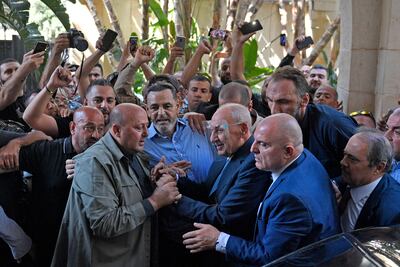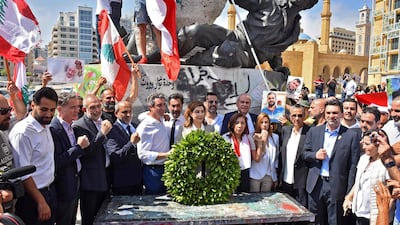A surprise in Lebanon’s recent parliamentary election was the victory of 13 candidates from lists formed by civil society. Many civil society groups active after the uprising of October 2019 have portrayed themselves as opponents of the main sectarian political parties and leaders who led Lebanon to ruin, and the legislators they helped to elect are often referred to as the “parliamentarians of the contestation".
While their motive is eminently laudable, these legislators will face major challenges in creating a space for themselves in Parliament. Not only are they a minority in a legislature under the control of the mainstream parties; not only will they have to deal on a daily basis with parties they claim to abhor; but for the moment, they are known mainly for what they oppose rather than for what they seek to achieve.
This is inevitable, given that they were elected from separate lists, formed independently, which in some districts competed against rival civil society lists. In other words, though these parliamentarians of the contestation immediately sought to co-ordinate their actions, they have no hierarchical structure to determine specific courses of action, address disagreements, or impose discipline.
They faced a first test on the day that Parliament elected its speaker, deputy speaker and bureau. In the first round of voting for a speaker, Nabih Berri received the 65 votes necessary to win, but not one vote more. It was the narrowest victory that Mr Berri had ever won, as he returned to the speakership for the seventh time. While some people claimed that the civil society bloc had voted for him, this was strongly denied by its parliamentarians.
In the more competitive election for a deputy speaker, which pitted Ghassan Skaff against Elias Bou Saab, the parliamentarians of the contestation cast a blank vote in a first round of voting. However, when they saw that in a second round of voting Mr Skaff, who identifies as an independent, might win against Mr Bou Saab, who is close to the Free Patriotic Movement (FPM) of Gebran Bassil, they voted for Mr Skaff. He lost by only a few votes.
The incident highlighted a major problem the independents may face. Those opposed to the FPM blamed them for failing to vote for Mr Skaff in the first round, arguing that their blank vote was a waste. Yet, even if they had voted for Mr Skaff, he could not have won. But in the deeply polarised political atmosphere in Lebanon today, trying to chart a middle course between the contending political alignments will only alienate the contestation bloc from those on either side of the divide.
One factor that further complicates the breakdown of Parliament is the confusion over what being an independent candidate actually means. The parliamentarians of the contestation consider themselves independents, but they were elected on lists formed by civil society groups. There are also many self-declared independent parliamentarians, such as Mr Skaff, but who were elected on lists formed by political parties, or who have clear political allegiances, such as Jamil Al Sayyed, who is close to Hezbollah.
In other words, the parliamentarians of the contestation will struggle to define their identity in the legislature, since the public will often wonder what independence from the major political parties entails. This won’t be helped by the fact that the contestation bloc will have to negotiate and make compromises with representatives of those parties over legislation, which may bring accusations that they have betrayed their commitment to combatting the shady dealings of the political class.

Yet, judging the contestation bloc hastily is a mistake. It’s too early to reach final conclusions as they begin to manoeuvre in an institution that is weighed against them. If this bloc picks its fights carefully and advances specific causes that its members have long defended, and if it can position itself as a swing bloc in the event of divisions over major legislation, it could garner considerable influence.
That is why the contestation bloc has to agree in the coming weeks what it considers to be its legislative priorities. Even if it is not a political party, the demands of its diverse members overlap in major ways. They will have to act in a concerted fashion to play up their bloc’s strength, namely that on a number of issues its backing may be essential for giving a majority to one of the two very broad alignments in Parliament – one dominated by Hezbollah, the other by the Lebanese Forces.
They will also have to ignore criticism that compromising with the major parties constitutes accepting Lebanon’s corrupt order. Bloc members did not enter Parliament to take a holier-than-thou attitude towards their peers. They entered to advance specific causes, and legislative bargaining is an inevitable part of that process. Nothing would be more damaging for the contestation bloc than to come out looking ineffectual because it has become a prisoner of its principles.


